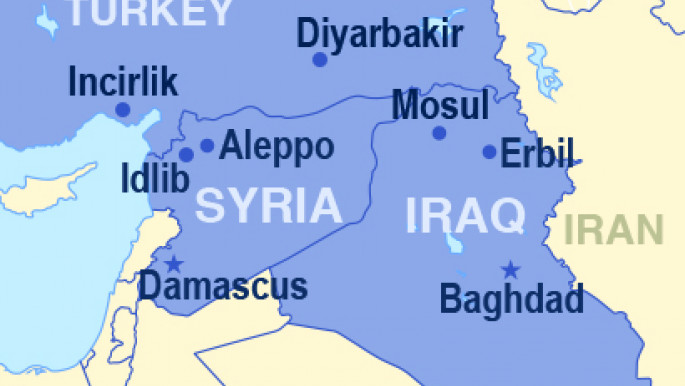NATO stands in 'strong solidarity' with Turkey against 'terrorism'
NATO held an emergency meeting at Turkey's request on Tuesday to discuss Ankara's military campaign against Islamic State (IS) fighters and Kurdish militants in Syria.
Turkey, the alliance's only Muslim member and one of its most powerful, called for consultations with its allies after a bloody attack it blamed on "terrorists" in the southern town of Suruc last week.
 |
|
Jens Stoltenberg, the Norwegian NATO Secretary General, addressed the media at 0900 GMT before the meeting of ambassadors from all 28 NATO countries.
Stoltenberg said Tuesday that the military alliance stood firmly by key member Turkey in the face of "terrible acts of terror" and instability along its southern border.
"NATO is following developments very closely and we stand in strong solidarity with our ally Turkey," Stoltenberg said at the opening of the meeting.
Turkey is likely to face questions at the NATO meeting over its decision to lump its campaigns against the Kurds and IS together into a broad "war on terror", even though the secular Kurdish groups and the Islamist IS organisation are themselves bitterly opposed.
Stoltenberg told the BBC on Sunday that "self-defence has to be proportionate" and that Turkey had not asked for military help.
The meeting comes a day after the United States and previously reluctant Turkey agreed to work together to drive IS out of northern Syria in a potentially game-changing accord.
But at the same time Turkish Prime Minister Ahmet Davutoglu vowed to press ahead with strikes against the outlawed Kurdistan Workers' Party (PKK) until the group disarmed.
Shattering a 2012 truce, Turkish forces shelled a Kurdish-held village in northern Syria on Monday while its warplanes continued to pound Kurdish targets in northern Iraq.
IS-free zone
Following Monday's agreement, a senior US official told AFP that Ankara and Washington aimed to establish an IS-free zone "and ensure greater security and stability along Turkey's border with Syria".
Details of the zone "remain to be worked out", said the official during a visit by US President Barack Obama to Ethiopia, adding that joint efforts would not include Turkey's demand for the imposition of a no-fly zone.
Turkey would support US "partners on the ground" already fighting IS extremists, the official added.
Turkey called for Tuesday's meeting of all 28 NATO member ambassadors at the Brussels HQ under what is known as Article 4.
The US-led military alliance held similar meetings - again at Turkey's request - in 2003 over the Iraq war and in 2012, when the allies agreed to deploy Patriot anti-missile batteries along its southern border to boost defences against any overspill from the Syria conflict.
Turkey would support US "partners on the ground" already fighting IS extremists, the official added.
But the accord and Turkey's military action against the Kurds have raised doubts over its priorities, namely whether it is more interested in limiting Kurdish capabilities in Syria and Iraq than tackling IS.
The PKK has fought a decades-long insurgency in southeastern Turkey but maintains rear bases in northern Iraq.
Ankara regards the main Syrian Kurdish group fighting IS - the Democratic Union Party (PYD) - as the PKK's Syrian branch.
"We will continue our fight until we obtain a certain result," Davutoglu told ATV television, urging the Kurdish separatists to deliver on a 2013 promise to lay down arms.
US State Department spokesman John Kirby said that Turkey had a "right to defend itself" against the PKK, which the US also labels a terrorist organisation.
French President Francois Hollande said on Monday that Turkey must "be careful not to confuse the target".
Stoltenberg also cautioned Ankara about burning bridges with the Kurds.
"For years there has been progress to try to find a peaceful political solution," he told Norwegian state broadcaster NRK.
'Change the balance'
Turkey's military campaign is a major turning point and Davutoglu said Ankara's intervention in Iraq and Syria would "change the balance" in the region.
Turkey has also given the United States the green light to use its Incirlik air base to attack IS after months of tough negotiations.
Davutoglu ordered the airstrikes and artillery barrages after a devastating suicide bombing last week in a Turkish town close to the Syrian border that killed 32 people.
Ankara blamed the attack on IS.
The bombing in the predominantly Kurdish town of Suruc incensed Turkey's Kurds, who have long accused the government of colluding with IS, allegations the authorities categorically deny.
The PKK said a truce between the government and the militants that has largely held since 2013, while peace talks were ongoing, had been rendered meaningless by the attacks





 Follow the Middle East's top stories in English at The New Arab on Google News
Follow the Middle East's top stories in English at The New Arab on Google News
![Israeli forces ordered bombed Gaza's Jabalia, ordering residents to leave [Getty]](/sites/default/files/styles/image_330x185/public/2176418030.jpeg?h=a5f2f23a&itok=_YGZaP1z)

